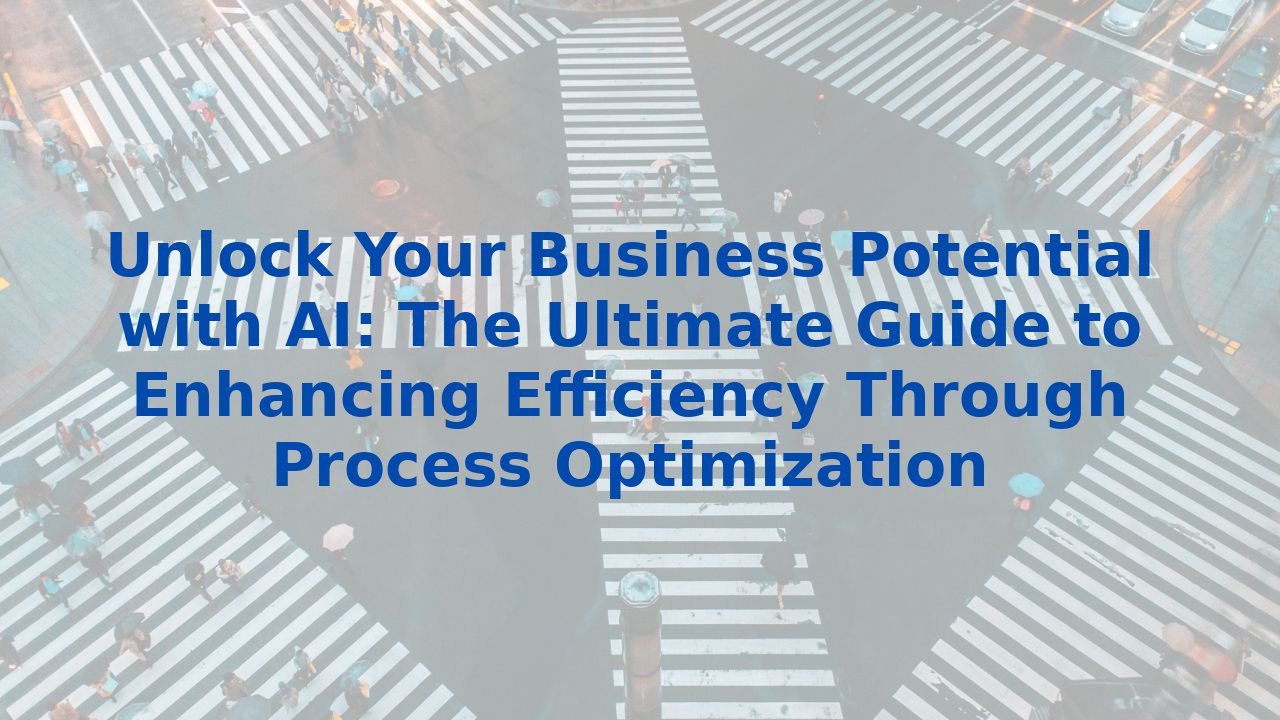Unlock Your Business Potential with AI: The Ultimate Guide to Enhancing Efficiency Through Process Optimization
Unlock Your Business Potential with AI: The Ultimate Guide to Enhancing Efficiency Through Process Optimization
Introduction
In today’s hyper-competitive landscape, businesses are constantly seeking innovative ways to enhance efficiency and productivity. As organizations navigate an intricate web of operations, artificial intelligence (AI) has emerged as a transformative force. By harnessing AI, businesses can unlock new levels of efficiency through process optimization, ultimately leading to improved productivity, reduced costs, and smarter decision-making.
Understanding AI Process Optimization
AI process optimization is the practice of leveraging machine learning and data-driven insights to refine business processes. This entails analyzing data, automating tedious tasks, and enhancing decision-making capabilities. The crux of this optimization lies in decreasing errors, boosting productivity, and increasing operational efficiency.
Enhancing Business Processes with AI
1. Process Discovery
AI plays a pivotal role in uncovering existing business processes through techniques like process mining and natural language processing. It sifts through vast datasets to reveal inefficiencies and bottlenecks that human examination might miss. For instance, AI can identify operational anomalies, equipping businesses with actionable insights to reshape their models and enhance performance.
2. Process Mapping
Utilizing AI for real-time data analysis ensures that process maps remain current and accurate. Continuous monitoring allows for the early identification of potential issues, empowering organizations to document and refine their workflows effectively. By automating process mapping, businesses can redirect their attention toward strategic initiatives rather than manual documentation.
3. Process Automation
With AI-driven solutions, organizations can automate repetitive tasks like document processing and data entry. Intelligent Document Processing (IDP) is a remarkable advancement that minimizes human involvement, reducing errors and significantly increasing efficiency. Imagine AI extracting data from invoices directly into billing systems—an approach that not only streamlines financial processes but also enhances overall operational effectiveness.
4. Process Management
AI continuously monitors business processes, using historical data to notify management regarding possible disruptions. This proactive stance allows organizations to swiftly address issues before they escalate. The result? Real-time insights permit companies to solve problems proactively, ensuring operations remain smooth and opportunities are seized instantly.
5. Process Improvement
One of the standout advantages of AI lies in its ability to facilitate continuous improvement. By harnessing predictive modeling and root cause analysis, AI provides data-driven insights that drive sustainable enhancements. Organizations can implement ongoing feedback loops to ensure business process management strategies evolve dynamically, aligned with changing market demands.
Benefits of AI in Business Process Management
1. Improved Decision Making
AI significantly enhances decision-making processes. By processing structured and unstructured data, it extracts relevant patterns that inform strategic choices. This can manifest in simulations, which help businesses assess potential profitability outcomes based on varying pricing strategies, leading to more informed decisions overall.
2. Enhanced Productivity
With AI assuming the burden of manual tasks, businesses are freed to focus on higher-value activities. This not only leads to increased productivity but also enhances employee satisfaction as teams engage in more meaningful endeavors. For example, HR departments can automate administrative tasks such as salary negotiations and performance assessments, allowing them to concentrate on talent development.
3. Risk Identification and Mitigation
AI excels in identifying potential risks by monitoring data for deviations. By proactively addressing anomalies, organizations can ensure compliance and mitigate disruptions. In analyzing historical data on workflows, AI can also forecast potential bottlenecks, allowing for preemptive actions to maintain seamless operations.
4. Customer Experience Enhancement
AI's impact on customer service is profound, as it analyzes interactions and distills feedback into actionable insights. By employing chatbots for basic inquiries and analyzing customer requests, businesses can enhance service quality and personalize the overall customer experience. The result? Increased customer loyalty and satisfaction.
The Role of Training in AI Adoption
While the benefits of AI are vast, realizing its full potential necessitates a well-trained workforce. Effective training programs should emphasize:
- Understanding AI Capabilities: Employees must grasp AI's functions and limitations, gaining insights into machine learning algorithms and their applications.
- Effective Tool Utilization: Practical training on AI tools should facilitate integration into existing workflows, helping employees interpret insights effectively.
- Data Analysis Skills: Equipping employees to analyze and interpret AI-generated data—using visualization tools—forms the backbone of informed decision-making.
- Continuous Learning: With AI and business environments evolving constantly, ongoing education is crucial to keep teams abreast of the latest advancements.
Conclusion
AI possesses the potential to revolutionize business processes, propelling organizations toward enhanced efficiency and strategic advantages. By embracing AI in our discovery, mapping, automation, management, and improvement endeavors, we position our businesses for sustainable growth. Coupled with robust employee training, AI stands as a pillar for unlocking unprecedented business potential. Embrace this journey, and watch your organization flourish.



